
Warwick and the team at the Hovercraft Museum Trust, in Gosport, Hampshire (UK) have very kindly allowed me to host some of their incredible collection, with rare if not single copies of photographs far back into hovercraft history. Over 2,000 images in this amazing selection of galleries!!
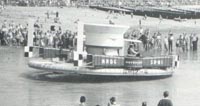
The SRN1 was the first full-sized proof-of-concept hovercraft, built in 1959 by Sauders Roe (Aviation) under commission from the British National Research and Development Corporation (NRDC).
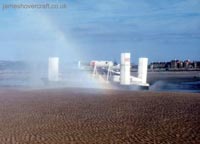
The Vickers VA-3 was a craft trialled and developed in 1962, soon after the SRN1 proved the hovercraft concept viable. British United Airways ran the VA.3, after trials in the Solent, on the first ever passenger hovercraft route. This route was run across the estuary of the River Dee between Rhyl, North Wales and Wallasea, nr. Liverpool. The service shuttled a maximum of 24 passengers between the two sites, and was scheduled to run 12 trips a day for an experimental 2-month (59-day) period.
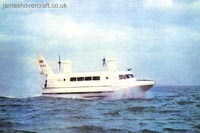
Southdown Motor Services and Westland Aircraft ran the SRN2, a 48 seater craft, between Eastney to Ryde across the Solent, in 1963/4. Early trials and runs gallery | Eastney to Ryde gallery
-30.jpg)
First flown 1963, and prided at the time for being the world's largest hovercraft, the SRN3 was developed for use as a military high-speed, amphibious, load carrying vehicle, and as a military patrol boat with the capability to lower two water screws driven by their own power units, for accurate low-speed manoevering.
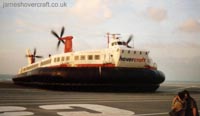
The history of the largest passenger hovercraft ever, the SRN4 (and SRN4-Super 4), which once operated between Dover (England) and Calais (France), at over 60 miles per hour carrying both passengers and cars. This section of the website is dedicated to information and photographs about this unique service, its development and its hoverports.
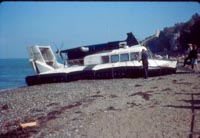
Initially developed, trialled and manufactured from 1963 by Westland in parallel to the SRN6, the SRN5 is a smaller, less powerful version of the single-engine version of its sister model, and is virtually identical in design
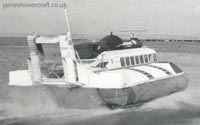 SRN6s at Ramsgate, 1960's, with Hoverlloyd | SRN6s with Hoverlloyd (J Lawrence) | SRN6s at Cowes, with Seaspeed (J Lawrence) | SRN6s at Southsea, Ryde, with Hovertravel (J Lawrence) | SRN6s operating with the Inter-Service Hovercraft Trials Unit (J Lawrence) | SRN6 Twin-Prop at the Hovershow 2009
SRN6s at Ramsgate, 1960's, with Hoverlloyd | SRN6s with Hoverlloyd (J Lawrence) | SRN6s at Cowes, with Seaspeed (J Lawrence) | SRN6s at Southsea, Ryde, with Hovertravel (J Lawrence) | SRN6s operating with the Inter-Service Hovercraft Trials Unit (J Lawrence) | SRN6 Twin-Prop at the Hovershow 2009 -53.jpg)
British Hovercraft Corporation's BH.7 "Wellington" class was designed for military use. Prototype P235 started service in the Royal Navy in 1970, trialling marine mine hunting techniques out of the Royal Navy Air Station at Portland, UK. Following service with the Navy, the craft was retired to The Hovercraft Museum, where she still exists now.
-14.jpg)
With the exception of the Hovercat, Hovermarine's craft were so-called "Sidewall" hovercraft, that is, non-amphibious craft with their hulls partially lifted out of contact with the water by an inflatable mid-section rubber skirt
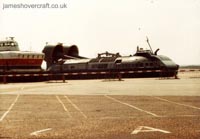
The Vosper Thornycroft Group were responsible for the creation of several types of hovercraft, including the VT-1, VT-2 and Fast Patrol boats. Their original craft, the VT-1 was not amphibious as it was thrusted by means of a water propeller. However, this was revised in the VT-2 and changed to two air-ducted propellers, allowing full amphibious capabilities
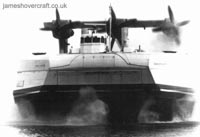
The N500 Naviplane was a venture by French company SEDAM, in 1976, who had built smaller models of hovercraft previously namely the N102 and N300. Two production N500s were built, the Ingenieur Jean Bertin and the Côte d'Argent. For a short while, the N500 earned the title of the largest hovercraft in the world, with a displacement when empty of 118 tonnes.
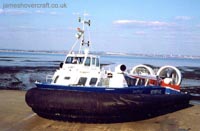
The AP1-88 was developed jointly by British manufacturer Hoverwork, BHC (British Hovercraft Corporation) and the NRDC (National Research Development Council) from 1981, with the first pre-production prototype being built and tested in 1982.
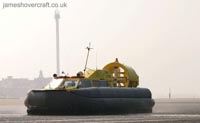
Manufactured in 1975 by Air Vehicles on the Isle of Wight, Tiger 12 is on the of the quietest hovercraft ever manufactured, emitting a pleasant 62dB at full power. Tiger 12 is a slightly different design to the classic hovercraft, featuring a permanently inflated upper skirt section (similar to the Pindair Skima 12) for rigidity and buoyancy, and a lower section inflated by air from the lift fan. The first Tiger 12 began operations in 1975 in the UK, North America and Africa, specified to carry 2 crew and 10 passengers
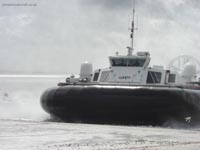
Designed and built by Hoverwork Ltd., UK, the BHT-130 is the modern successor in their line of craft to the widely used BHC/Hoverwork AP1-88. Using many of the design principles of the AP1-88 (centre, elevated cockpit, bilateral bow thrusters, ducted rear propellers and more) the BHT-130 provides a quieter, smoother ride than its predecessor, and increased capacity for both passengers or freight
-56.jpg)
Hovercraft were the best practical means of transportation for the British Antarctic Survey in the Sea Nunataks area. In other areas skidoos and sledges would normally suffice. With summer temperatures mostly between -15°C and 0°C and 24-hour daylight, pools of meltwater formed over 10m deep in places on the ~100m thick ice, in and amongst areas of blue ice and snow. It is a fair conclusion that no other method of transport could cope with such variable terrain.
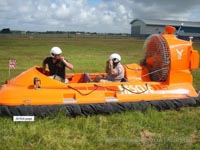
The Association of Search and Rescue Hovercraft (Gosport Branch) formed in 2005 as a seperate entity from the then ASRH, and is run by a small group of volunteers who have come together and raised enough money to buy a rescue hovercraft, saving lives of people when boats can't get to them, for example people stranded on mud flats.
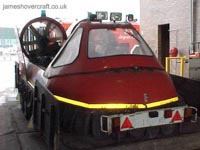
Before the days of Terminal 5 at London's BAA Heathrow Airport, there was a vast expanse of swampland and sewage works in an area called Perry Oaks, at the western-end of the two main runways. For the sake of safety, should a plane have come down in these water areas, Heathrow Airport's Fire Department, located within the Perry Oaks of the airport, owned a rescue hovercraft, a Hoverguard 80.
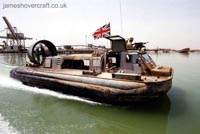
Hovercraft are used all over the world for a variety of different purposes, be they heavy lifting gear (zero friction skirt provides a perfect platform for moving heavy objects), tourism, industry or even military uses.
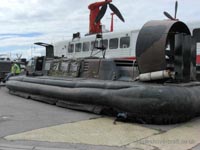
The British Royal Marines use Griffon hovercraft for landing and troop transport. This craft was being hovered at the Hovercraft museum's August 2011 open day and members of the public allowed on board for a quick flight.
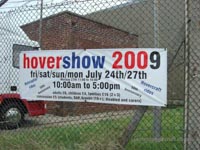
2009 marked the 50th anniversary of the hovercraft as we know it today. To mark this special occasion, the Hovercraft Museum at HMS Daedalus, Lee-On-Solent, made their annual Hovershow an even more special event. I took a trip to the hovershow to see what was going on, and amidst the hubbub, managed to get a few photographs of a few of the exhibits.
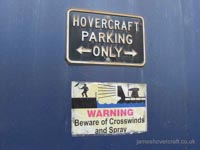
The Hovercraft Museum's August 2011 Open Day was a good day out for families and enthusiasts, with all the hangars and exhibits open to the public, a tea room and even a hovering experience on board a Royal Marines Griffon 2000 craft. Also giving live displays were the UK's Model Hovercraft Association.
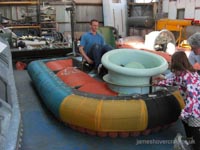
Steam Boat Willy's origins were in 1994 as part of a student project at University College London's Human Powered Flight Club. It was the only vehicle of its type in the world, that being a one-man powered hovering and controllable hovercraft.
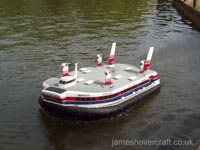
If you own or have built model hovercraft, either functioning RC models or static display models, I'm looking for you to please send in your pictures, tales, stories, experiences, videos etc. of model hovercraft! I aim to put on a page for each, or at least a photo, including anything you would like to put onto it! I know there are some very good models out there, both kit built or hand made, and I would like to be able to give the creators and builders credit and recognition for their work.
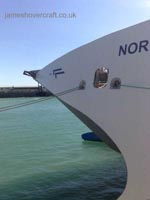 I know it's not a hovercraft, but catamarans saw the death of the SRN4 service between Dover and Calais. Hoverspeed (at the time) deemed them cheaper to run, with similar crossing times yet an improved level of passenger comfort
I know it's not a hovercraft, but catamarans saw the death of the SRN4 service between Dover and Calais. Hoverspeed (at the time) deemed them cheaper to run, with similar crossing times yet an improved level of passenger comfort 
The last landings of the world's first and only supersonic passenger jetliner, Concorde,
were on the 24th October 2003 at about 1600hrs, at London Heathrow Airport.
To commemorate these and the history of Concorde, a great feat of engineering
and a beautiful craft, I set up this section of the website.





-30.jpg)



-53.jpg)
-14.jpg)





-56.jpg)









